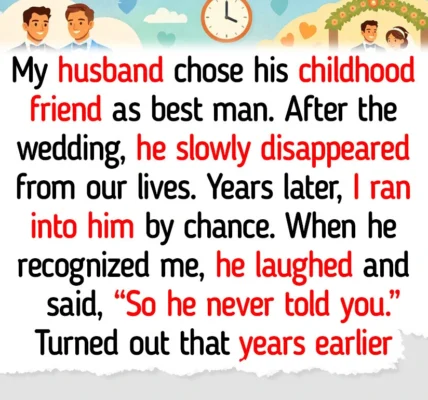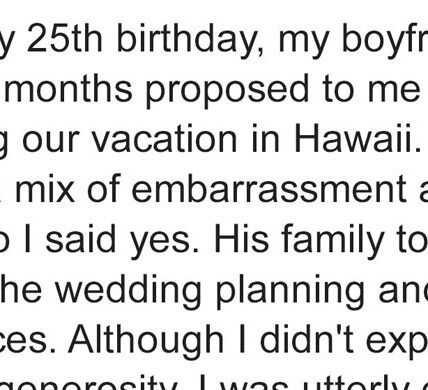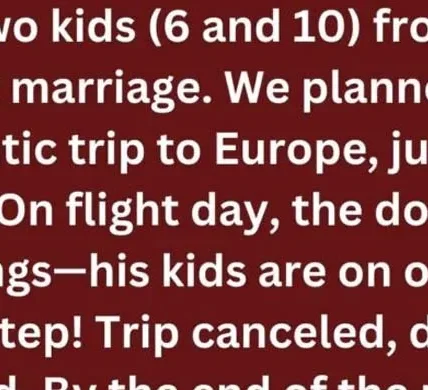I bought a warm meal for a homeless man, thinking it was just a small gesture of kindness. But when he found me the next day with his eyes full of tears and a confession that broke my heart, I realized how powerful even the smallest acts of compassion can be.
They say a little act of kindness goes a long way. But when I decided to help a hungry homeless man one day, I wasn’t prepared for the heart-wrenching encounter that followed less than 24 hours later. This stranger I helped with food made a confession that brought me to tears and reminded me why some people cross our paths when we least expect it.
Between the past two days, my life turned into something straight out of an inspirational movie.
I’m a mom of four wonderful, chaotic children ranging from four to eight years old. Life is a constant juggling act between my part-time teaching job and managing our home while my husband Mason works as an engineer.
Our life isn’t fancy, but the laughter of our kids fills every corner of our modest house with joy.
That morning started like any other. I had my wrinkled shopping list in one hand and my desperately needed coffee in the other, mentally calculating how to stretch our budget through another week of feeding four growing children.
The fluorescent lights of Happinezz Mart buzzed overhead as I stood in the parking lot, gathering my energy for the weekly shopping marathon. The morning air was crisp, carrying the first hints of winter as I pulled my cardigan tighter around myself.
That’s when I saw him. A homeless man, holding a desperate sign that read, “HELP.”
The first thing I noticed was his eyes. They weren’t looking at me, or anyone else… just fixed on the displays of fresh bread and fruit through the grocery store window.
His weathered jacket hung loose on his thin frame, and his gray hair poked out from under a worn cap. His hands, I noticed, were clean but rough, like someone who had worked hard his whole life.
I don’t know what made me stop. Maybe it was the way his shoulders slumped, or how his fingers unconsciously moved toward his empty stomach.
Maybe it was because he reminded me of my father who’d passed away last year with that same quiet dignity in the face of hardship.
Dad had always taught us that true strength wasn’t in never needing help, but in being brave enough to accept it when offered.
“Excuse me, sir,” I approached the man. “Are you hungry? Would you like something to eat?”
He turned to me slowly and I saw desperate hunger in his eyes.
“More than you can imagine, young lady! I haven’t eaten since yesterday morning.”
My heart broke for this man. How often do we walk past the homeless, oblivious to their suffering? And how often do we see beyond their situation and offer them compassion, not just a piece of bread?
“Please, come shop with me, sir. I’m Greta. I’ll pay for your groceries.”
“Miss, I can’t accept—” he hesitated, but I cut him off gently.
“I insist. Besides, I could use some company while I shop. My kids aren’t here to argue about which cereal has the better toy inside. And honestly, shopping alone is pretty boring.”
A small smile cracked through his weathered face. “I’m Morgan. And… thank you. You remind me of my late daughter, Grace. She always helped people too.”
Walking through the aisles with Morgan was an exercise in humility. He’d reach for the cheapest bread, the marked-down cans, pulling his hand back whenever he thought he was asking for too much.
Each time he apologized, my heart would break a little more.
“These are good,” he said softly, pointing to some discount soup cans. “They last a while. And they’re easy to heat up if… well, if you can find a place to heat them.”
“Let’s get some meatloaf and mashed potatoes, too,” I suggested, steering us toward the deli section. “When’s the last time you had a proper, hot meal?”
Morgan’s eyes misted over. “Been a while. Used to grow my own vegetables and sell them to buy those delicious meals, you know. Had a little garden behind my house. Tomatoes, cucumbers, even some strawberries.”
As we walked, I found myself talking about my family, filling the awkward silence with stories about my kids. Morgan listened intently as if each word was precious.
“My kids would love these,” I said, tossing some cookies into the cart. “The twins, they’re six, and they’d eat the whole package if I let them. Last week, they tried to convince me that cookies counted as breakfast!”
Morgan’s eyes softened. “How many children do you have?”
“Four of them,” I laughed, pulling out my phone to show him a picture. “The twins, Jack and James, they’re convinced they’re going to be soccer stars, even though they trip over their feet half the time. Then there’s little Lily, she’s four and obsessed with bubble gum. She once stuck gum in her brother’s hair and we had to cut it out. And Nina, my eight-year-old bookworm.”
“She looks just like you,” Morgan said, pointing to Nina in the photo. “Same smile, same kind eyes. You have such a beautiful family.”
“That’s what my husband always says. Though I think she got his brains, thank goodness! She’s reading at a sixth-grade level already. Sometimes I find her up past bedtime, flashlight under the covers, cooing, ‘Just one more chapter, Mom, please?’”
“They’re beautiful. You must be very proud. Sometimes I wonder…” Morgan trailed off, and I pretended not to notice as he wiped his eyes with his sleeve.
As we checked out, I noticed his hands trembling slightly as he helped bag the groceries.
When I handed him his bags, including both gallons of milk I’d bought, his eyes welled up.
“I don’t deserve this kindness.”
“Everyone deserves kindness, Morgan. Everyone.”
“Thank you, ma’am! God bless you.”
And with that, we parted ways as I watched Morgan sit on the parking lot’s steps, happily eating his meal.
The next morning, my kids frustratingly stared at their dry cereal bowls. Jack pushed his bowl away dramatically, while James pointed out that this was clearly the end of the world.
“Mom,” Nina looked up at me, “did you forget to buy milk yesterday?”
“Oops, sorry, honey! I’ll get it today, okay?”
I’d forgotten that I’d given both milk gallons to Morgan, so here I was, back at the same grocery store, ready to face the morning rush. The twins had gone to school with promises of chocolate milk in their lunch boxes tomorrow to make up for the breakfast disaster.
The parking lot was busier, filled with moms like me doing their morning shopping. A school bus rumbled past, reminding me I had only an hour before I needed to be at school myself, ready to face a classroom of energetic third graders.
The sound of car doors slamming and shopping carts rattling filled the air.
I almost walked past him. The straight-backed man in the crisp military uniform couldn’t possibly be the same person I’d helped yesterday. But those eyes… I recognized them immediately.
“Greta,” he called out, his voice stronger than yesterday. “I hoped you’d come back. I’ve been waiting since dawn.”
“Wait a minute… aren’t you the homeless man I helped yesterday? Morgan, right?”
He gestured to a nearby bench. “Would you sit with me for a moment? I owe you an explanation. And maybe a thank you isn’t enough, but it’s where I need to start.”
“I was a Master Sergeant,” Morgan began, his fingers running over his uniform’s sleeve as we sat on the bench. “Twenty-six years of service. Lost good friends. Young men who never got to come home. But coming home… it was harder than leaving ever was.”
“What happened?” I asked softly, noticing how his hands clenched and unclenched as he spoke.
“PTSD. Depression. The usual story. My wife passed while I was overseas. Cancer. A year earlier, I’d lost my daughter in a tragic accident. Coming back to an empty house…” he shook his head.
“The silence was the worst part. No one telling me to take my boots off before coming inside. No one breathing beside me at night. No one to call me… Dad. One day, I just walked away from everything. Couldn’t handle the memories. I thought it was the only way to escape the pain.”
I reached out and squeezed his hand, my eyes moist. He squeezed back, his grip firm but gentle.
“Yesterday, when you looked at me — really looked at me — and showed me such simple kindness… it broke something loose inside.” Morgan’s voice wavered.
“And after you left, I stood there holding those bags of groceries, and for the first time in years, I felt human again. Not just a shadow sliding past people on the street.”
“So I walked into the VA office. Just walked right in. The lady at the front desk, she…” he paused, collecting himself. “She hugged me. Said they’d been worried sick about me. Turns out my old commanding officer had been looking for me for months. He even had people out searching the streets. I just… I never thought anyone would care enough to look.”
“They’re giving me a chance to help other vets,” Morgan continued, his face lighting up. “There’s this new program for soldiers just coming home. They want me to be a mentor and help them re-adjust before the darkness sets in. Share my story, you know? Show them there’s hope, even when it feels like there isn’t.”
“Morgan, that’s wonderful!” I felt tears sliding down my cheeks.
“Your kindness… it reminded me that I still have something to give,” he said, straightening his uniform jacket. “This morning, I got my first shower in months. Got my old uniform out of storage. Feels strange to wear it again. But positively strange. Like coming home… to a home I’m ready for this time.”
He reached into his pocket and pulled out two gallons of milk. “These are for your kids. Bought them just now. Can’t have your little ones missing their breakfast because of me. And this—” he pressed a folded piece of paper into my hand, “is my number. If you ever need anything, anything at all…”
“What about you? Will you be okay?” I asked, still worried.
“The VA’s got me set up in temporary housing. Starting counseling tomorrow. And next week, I start working with the new vets. Turns out my experience… even the bad parts… they might help someone else make it through.”
I hugged him tightly, not caring who saw. “Promise you’ll keep in touch?”
Morgan smiled, and this time it reached his eyes.
“Promise. Just keep teaching those kids of yours about kindness, Greta. It saves lives. I’m living proof of that. And maybe someday I can meet them. Tell them some stories about their mom, the angel who saved an old soldier’s life with food and a gentle word of kindness.”
I watched him walk away, his uniform gleaming in the morning sun, his steps sure and purposeful. My heart feels so full knowing Morgan is safe and cared for now. That he’ll have a warm bed, regular meals, and most importantly, a purpose again.
Sometimes the smallest acts of kindness create the biggest ripples, and I’m just grateful I got to be a part of Morgan’s story.


